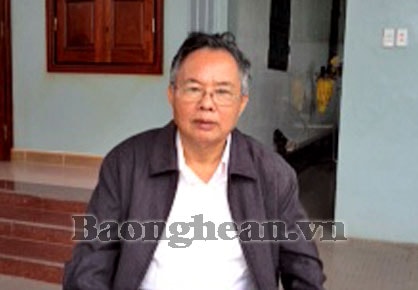Lieutenant General Pham Hong Minh: A glorious military career
As Deputy Commander of Military Region 4, promoted to general in 1998, but few people know that he had a glorious life and death journey. I met him at his private home in Hamlet 14, Nghi Long Commune, Nghi Loc District. He still looked agile and healthy for his nearly 70 years of age. He said that his eldest son had a house in Vinh but he wanted to come to this rural area to live with his wife for fun. And in the house deep in the quiet hamlet, I heard him tell about his military career...
(Baonghean.vn) -As Deputy Commander of Military Region 4, promoted to general in 1998, but few people know that he had a glorious life and death journey. I met him at his private home in Hamlet 14, Nghi Long Commune, Nghi Loc District. He still looked agile and healthy for his nearly 70 years of age. He said that his eldest son had a house in Vinh but he wanted to come to this rural area to live with his wife for fun. And in the house deep in the quiet hamlet, I heard him tell about his military career...
Joining the army in 1963, from 1964 to 1965, Mr. Pham Hong Minh was sent to study engineering officers in Nam Dan, to E18 - B 325, as a squad leader. Due to the bravery and intelligence of an engineering soldier, in February 1965, he was promoted to deputy platoon leader of Battalion 18B. In the battle in Tuy An - Phu Yen, he was wounded, while the wound was still painful, he still marched with his comrades to battlefield B and coordinated with Battalion 10 to sweep through Me Bong Con slope on Tuy An land to win every inch of land from the enemy.

By September 1967, the Platoon marched to Khanh Hoa, participating at the regimental level in the Mau Than campaign with fierce sweep operations. And in this battle, his unit was assigned the task of fighting at the regimental level by blocking ships and boats through the railway as well as the river, preventing the enemy from supplying military supplies. The deeper into the Eastern battlefield
By the end of 1969, his platoon entered the Southeast region, where they fought life and death battles with the enemy at Suoi Giay, Soc Con Trang on Highway 10 and Highway 13. After being sent to study for a year in Cambodia, he returned to the An Giang battlefield, where the 232nd Regiment attacked the Southwest gateway, paving the way for the legendary Ho Chi Minh campaign.
In 1971, remembering the battle in Binh Thuan, at that time he was the platoon leader of Platoon 7 of Company 7-G20. From fighting the engineers, he now switched to fighting the special forces. When entering the enemy base, he directly commanded the troops to attack, not allowing the enemy to fight back. He said: “While he and his teammates had to camouflage themselves by smearing black soot on their bodies, when entering the enemy base, they had to crawl through 12 barbed wire fences. When they got deep into the 6th fence, the enemy suddenly spread white lime powder, and the brothers had to use lime powder to camouflage the soot. Although my body was sore, my teammates and I still tried to lean forward. In this battle, we won big. I often told my teammates that special forces soldiers have the outstanding characteristic of fighting inside and out, fighting in the heart of the enemy, and only then can we win big with secret and surprise.”
There were long marches into fiercely occupied areas in the Southwest, for 3 whole months he and his comrades did not have even a grain of salt. There was a comrade who had malignant malaria, he went to a meeting of senior cadres and asked his superior for a pinch of salt for his soldiers to suck on, then had to give it to another comrade. Sometimes the whole platoon ran out of rice, the entire unit was deep in the base, he was forced to organize a battle to get rice.
His life was spent on a 9-year military career marching from North to South with 8 injuries. Now, every time the weather changes, his body aches. However, thinking back, he always cherishes the days on the battlefield, which gave him revolutionary ideals and valuable lessons as a cadre. He said that later, when peace was restored, what he felt was most precious was the comradeship in the resistance war. For him, the most important thing was that cadres and soldiers had to share hardships and difficulties. Also during the years of commanding on the fierce battlefields, he realized that training in technical and tactical techniques for soldiers was very important. And more importantly, it was necessary to educate and train cadres and soldiers to have a steadfast ideological stance. Even in wartime, when comrades and comrades considered death as light as a feather, they were steadfast in their fighting spirit despite hardships and dangers. Yet there are also weak, discouraged soldiers who ask to be discharged to get married, to take care of their elderly parents...
Now nearly seventy years old, Mr. Pham Hong Minh is still troubled by the current situation of the sea and islands, the evils of corruption, and the degeneration of lifestyle and morality among the youth. However, he still believes that by studying Resolution 4 of the Central Committee, party members and cadres will have internal improvements, thereby bringing about changes in their lives and perceptions. And according to him, the path that the Party is taking is forever heading towards the sun, towards prosperity and happiness as Uncle Ho wished for during his lifetime.
Thanh Nga






